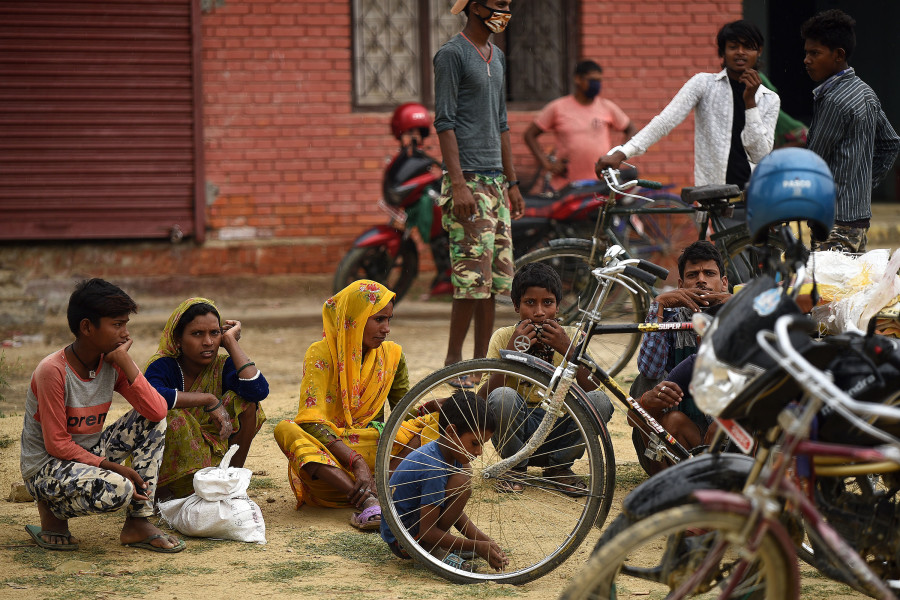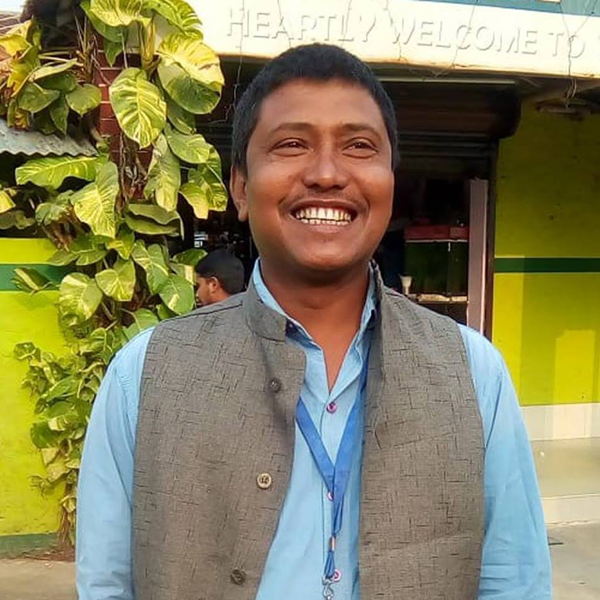Lumbini Province
Farmers in Bardiya brace for a poor paddy plantation season amid a scarcity of seeds and fertilisers
The Covid-19 pandemic has affected both production and supply lines, leading to shortages of seeds and chemical fertilisers as plantation season begins.
Thakur Singh Tharu & Janakraj Sapkota
When her two sons returned home on April 15 after three days of perilous travel from Kathmandu, Budhani Chaudhary was a happy mother.
The two men, both in their early 20s, spent 15 days in quarantine before arriving home. Budhani was going to make use of their labour in fields, as it was prime plantation season. But there were new problems.
The months-long lockdown meant that there were no jobs to take and hence, no money. Instead of an advanced breed of paddy seeds, she opted for a local breed. But then, there was a shortage of chemical fertilisers. Budhani would have taken a loan anyway, but fertilisers were unavailable anywhere in the district.
These days, Budhani worries whether her spring plantation will bear any harvest.
Like Budhani, a majority of farmers in Bardiya are struggling to get access to adequate seeds and fertilisers amidst the lockdown. Many farmers have yet to begin plantation.
Som Chaudhary of Badhaiyatal Rural Municipality in Bardiya turned to farming when he couldn’t return to his meat shop in Pokhara due to the lockdown. He had planned to plant paddy on the 1.5 bigha (10,159 sq m) of land his family has leased. But he faced problems from the very beginning. He struggled to get his hands on paddy seeds, which he received later and at a very high price, he said.
“There is an acute crisis of seeds and fertilisers,” said Som. “If the government doesn’t come up with any means to tackle this, paddy production will dip significantly this year.”
Som, for his part, has managed to obtain chemical fertilisers—100kgs each of urea and diammonium phosphate.
Prior to the pandemic, advanced breeds of seeds and chemical fertilisers would be imported from various Indian cities, according to Lal Bahadur Shrestha, chief of Badhaiyatal Rural Municipality. If there was a shortage in the local market, farmers could easily travel to the India border to purchase it.
But the Covid-19 crisis has affected supply chains and closed down fertiliser factories, leading to shortages in the market. Nepal requires 120,000 tonnes of urea and 50,000 tonnes of DAP for paddy plantation alone, according to officials at the Agriculture Ministry. Currently, Nepal only has 35,000 tonnes of DAP and 25,000 tonnes of urea in stock.
“The lockdown has halted imports and also prevented farmers from travelling to Indian towns to purchase seeds and fertilisers,” said Shrestha.
On May 27, the Bardiya District Administration Office wrote a letter to the federal Agriculture Ministry and the provincial ministry of social development, notifying them about the scarcity of fertilisers. In the letter, the office had requested at least 4,000 metric tons of urea, 2,500 tonnes of DAP, and 100 tonnes of potash.
But, the government is planning to provide only a fraction of what the district needs, said Shrestha.
“The government’s Agriculture Inputs Company has offered 300 metric tons of urea and 200 metric tons of DAP, less than 10 percent of our demands,” he said. “This small amount now risks chaos as farmers will flock en masse to the distribution centre. If the fertiliser scarcity extends for a week longer, paddy production in the district will likely decline by as much as 50 percent.”
Mohan Singh KC, chief of the Agriculture Inputs Company in Bardiya, said that they now only have 50 tonnes of DAP in stock. According to KC, Bardiya needs a total of 12,000 tonnes of chemical fertilisers, including urea, potash and DAP.
Farmers are now purchasing fertilisers and seeds smuggled over from India at exorbitant prices.
“I purchased five kilos of hybrid paddy seeds at Rs 550 per kilo, which is higher than last year,” said 52-year-old Prakash Tharu. “But that investment will be in vain if I’m not able to get fertilisers on time after transplanting the seedlings.”
On Thursday morning, a group of farmers were waiting outside a local cooperative in Khajura, Banke for fertilisers. Jahir Khan, a local farmer, said that he had been there every day for the past three day.
“But I haven’t got any fertiliser,” he said. “Four days ago, I sowed paddy seeds in two bighas of land. If I’m unable to place fertilisers within a few days, they will not grow properly.”
According to Nirmal Khanal, chair of Khajura cooperative, there’s only a limited stock of fertiliser left in the godown.
“The distribution of fertiliser has temporarily stopped as the remaining stock will not be adequate for all,” said Khanal. “We are trying to purchase fertiliser from Salt Trading and other places, but even they don’t have fertilisers.”
Agriculture experts are afraid that this shortage could lead to widespread food insecurity and an even bigger increase in Nepal’s reliance on food imports.
According to Sagar Dhakal, chief of the Agriculture Knowledge Centre in Nepalgunj which overlooks both Banke and Bardiya, this year’s paddy harvest could see a fall by 15 to 20 percent.
“If there is any shortage of fuel and irrigation, a further 25 to 30 percent of the harvest could be lost,” said Dhakal.
A decade ago, Bardiya had 75,000 hectares of cultivable land. But, the recent data showed that paddy cultivation is being done in around 46,000 hectares. Dhakal adds, “If the distribution of fertiliser and seeds is not eased and the lockdown prolongs, the production could fall and people might face famine this year.”
As the price of paddy seeds and fertilisers skyrockets in the face of the shortages, Budhani’s two sons Khusi Ram and Kailash are scrounging for money. But they haven’t been paid for the work they did in Kathmandu. Khusi Ram is owed Rs 29,000 and Kailash Rs 5,500, both of whom work as daily wage labourers in the construction sector.
Meen Bahadur Raut, the duo’s contractor, while speaking to the Post, promised to pay their wages in a few days’ time.
For Budhani, paddy plantation might already be a lost cause. She is now concerned with having enough to eat for as long as the lockdown lasts.
“In this crisis, it will be some relief for a few days if my sons get their wages,” she said.




 21.1°C Kathmandu
21.1°C Kathmandu















